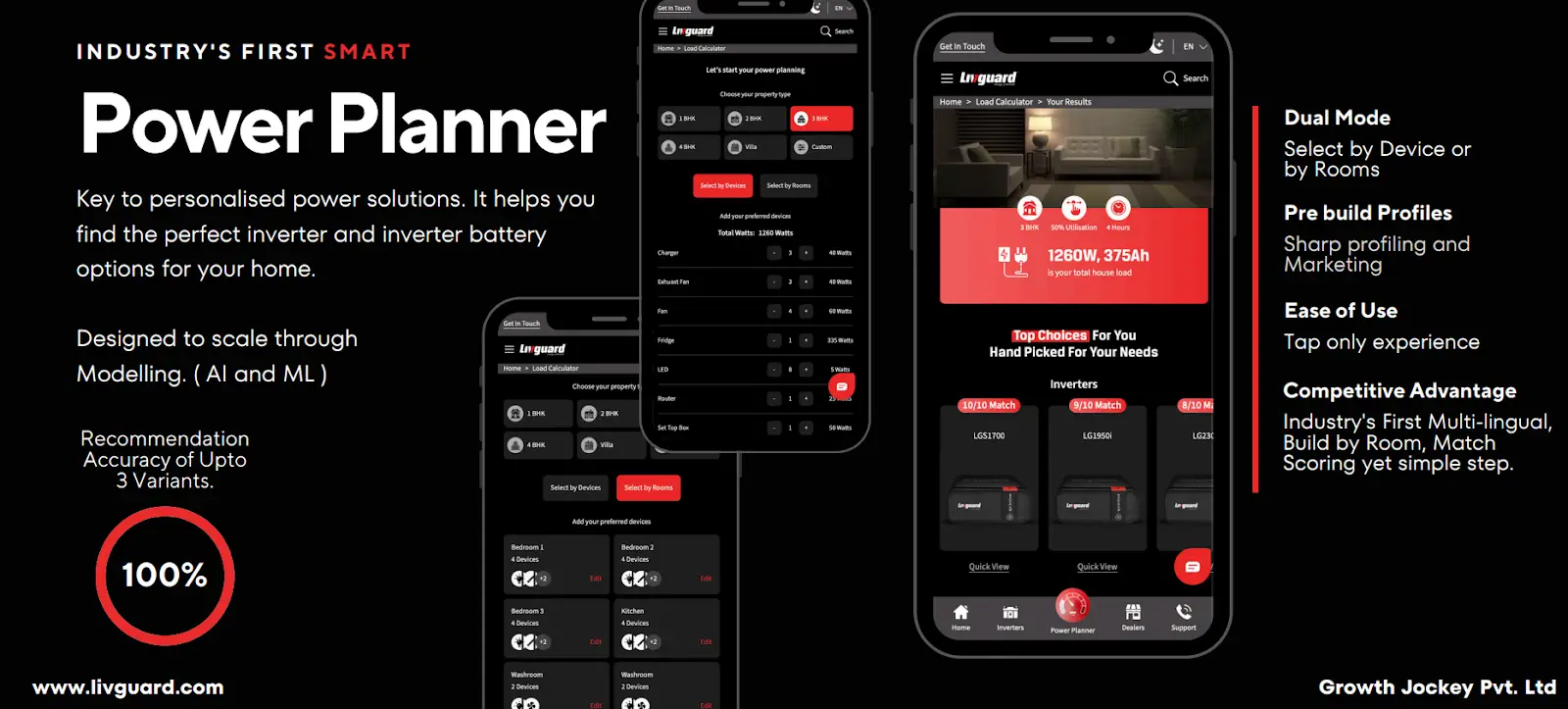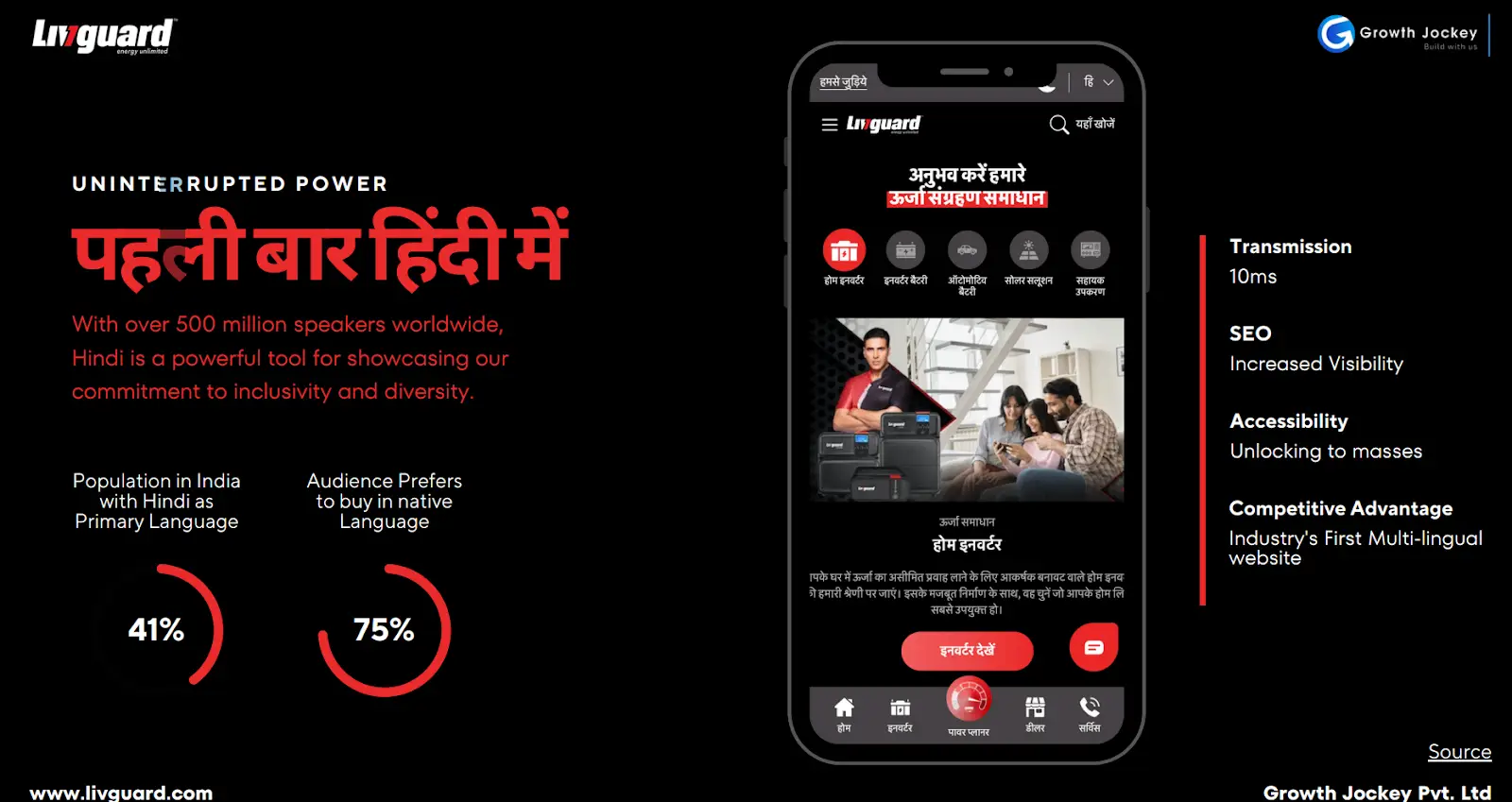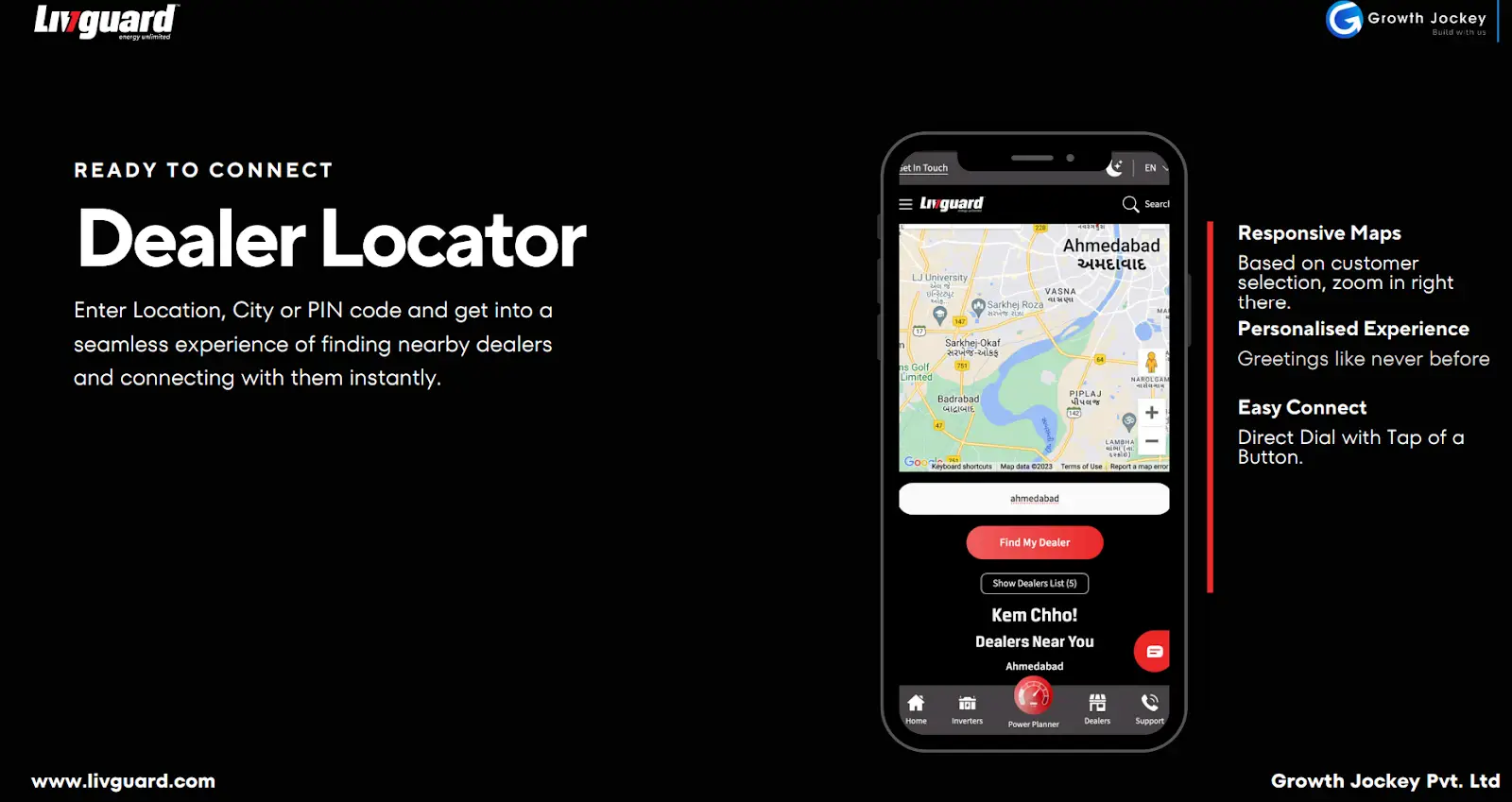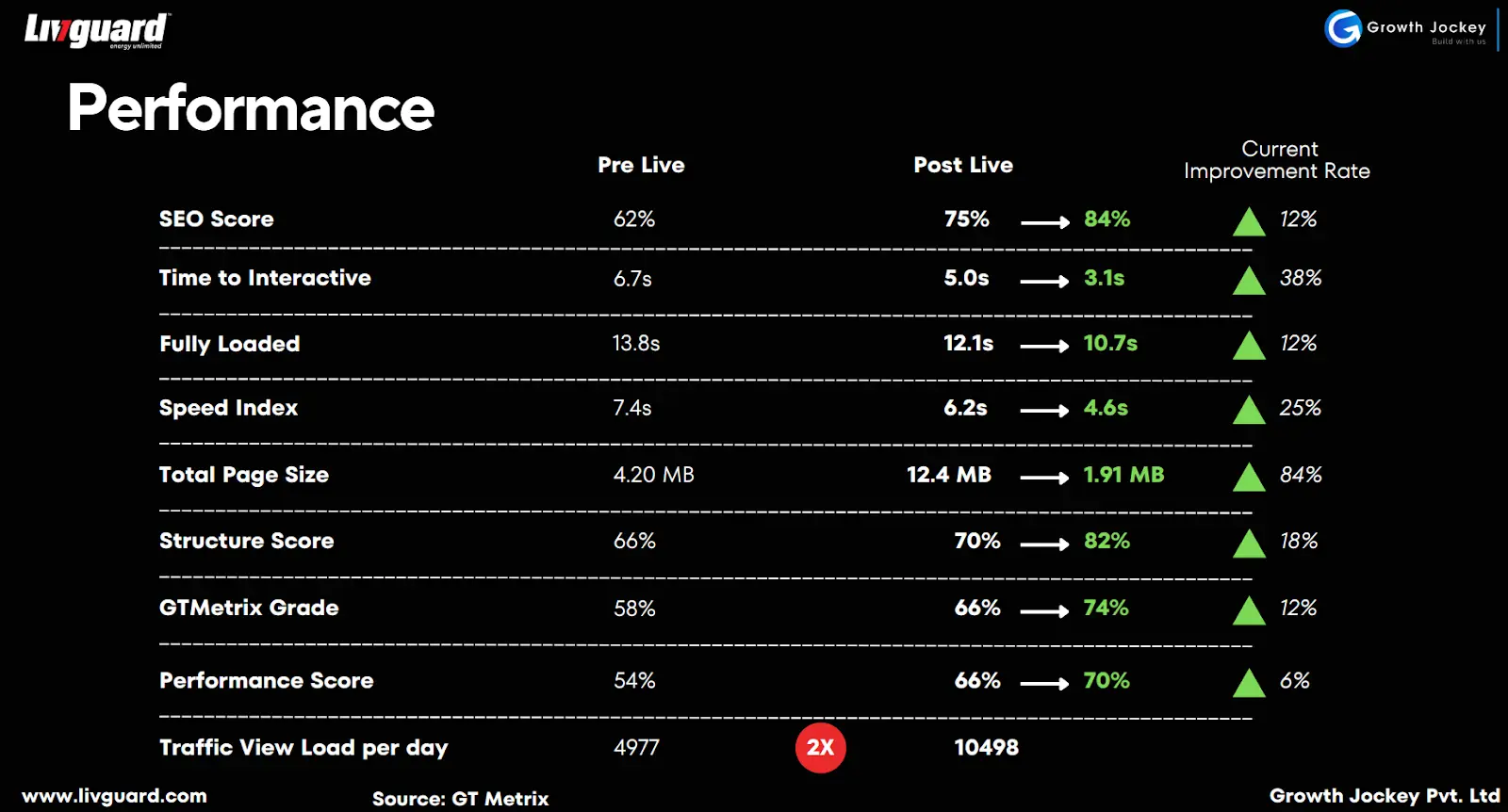How GrowthJockey Transformed Livguard's Digital Experience: Case Study Using AI and UX Innovation

The energy storage industry has long been trapped in outdated digital experiences. When was the last time you saw a dynamic and modern inverter website that improved your experience?
While organisations that adopt AI business strategies generate an average of 10-12% extra revenue, most inverter and battery companies still rely on static websites. These sites fail to guide customers through complex product decisions.
Livguard[1], one of India's fastest-growing energy storage brands, faced this exact challenge. Despite having innovative inverter and battery technology, their digital presence couldn't match their product excellence. Customers struggled to find the right solutions, leading to high bounce rates and missed conversions.
That's when GrowthJockey stepped in with a radical reimagining of the buyer journey. Our team combined AI-powered personalisation with intuitive UX design to create what would become the industry's first truly intelligent energy solutions platform.
The results are staggering - 760% increase in page views, 260% growth in daily users, and a complete transformation of how customers discover and purchase energy solutions.
Let’s find out in our Livguard AI and UX case study how our team turned a static website into an industry discussion.
The Livguard website challenge: When complexity kills conversions
The energy storage industry has a dirty secret. While 71% of e-commerce sites offer product recommendations[2], most inverter brands still treat their websites like digital brochures.
Livguard faced this exact problem before their transformation. Despite being India's fastest-growing energy storage brand, their digital presence couldn't match their product excellence.
The product complexity trap
Customers visiting Livguard's website encountered over 100 product variants. Different Livguard inverter capacities, multiple Livguard inverter battery types, and countless combo configurations created decision paralysis.
A typical customer journey looked like this →
Browse inverters, get confused by technical specifications, abandon cart, repeat.
The bounce rate hit 24.64% with average engagement times under 32 seconds.
Technical barriers blocking conversions
Most homeowners don't understand wattage calculations or backup hour requirements. Yet Livguard's original site demanded this knowledge for product selection.
This created a massive gap between customer needs and website functionality. Users wanted simple solutions, but got complex technical specifications instead.
Check out how GrowthJockey turned Livguard’s website into a scalable AI platform
Why traditional e-commerce approaches failed
Standard e-commerce case study solutions don't work for technical products. Generic recommendation engines can't handle the complexity of power calculations and compatibility requirements.
The challenge wasn't just about AI in e-commerce implementation. It required reimagining how customers discover and purchase energy solutions entirely.
This Livguard case study began with a fundamental question. How do you simplify complex technical decisions without losing accuracy or customer trust?
That's where GrowthJockey's AI in customer experience approach made all the difference.
GrowthJockey's AI in customer experience strategy for Livguard
Traditional AI and e-commerce solutions treat every product the same. But energy storage isn't like buying shoes or books.
We needed an approach that understood the unique challenges of this digital transformation case study. Complex technical products demand intelligent guidance, not generic recommendations.
The 5i framework for AI in sales and marketing
The strategy began with our proven 5i methodology.
-
Ingestion unified Livguard's fragmented data across product catalogs and customer touchpoints.
-
Interpretation layered AI in customer experience intelligence on top of raw data streams. This enabled real-time understanding of user intent and behaviour patterns.
-
Insight surfaced actionable intelligence that shaped every design decision. We discovered 75% of Livguard inverter searches originated from mobile devices.
-
Intervention enabled intelligent actions that optimised outcomes at every customer touchpoint.
-
Impact measurement ensured continuous improvement through precise performance tracking.
The Intellsys advantage in energy retail
Our proprietary Intellsys platform powered the entire change. Unlike generic AI and e-commerce tools, Intellsys understands technical product complexity.
The platform unified customer data from search patterns, product interactions, and purchase histories. This created comprehensive user profiles for personalised experiences.
Machine learning algorithms analysed user behaviour to predict optimal product matches. The system learned from every interaction, becoming smarter over time.
Strategic focus areas for intelligent transformation
We identified three critical intervention points in the Livguard inverter battery buyer journey.
-
Product discovery
-
Technical guidance
-
Purchase confidence
Each touchpoint needed AI in sales and marketing intelligence that simplified complexity without sacrificing accuracy. The goal was effortless decision-making for customers.
This case study required balancing automation with human insight. Technology enabled the experience, but customer needs drove every decision.
Read our guide to learn more about how agentic AI is changing the retail space
Implementation: AI in e-commerce examples that transformed Livguard
Building India's smartest energy platform required reimagining every aspect of the customer journey. We didn't just add AI features - we rebuilt the entire experience around intelligent decision-making.
The industry's first AI-powered load calculator
Our breakthrough innovation was the smart power planner that eliminated guesswork for Livguard inverter selection. Customers could calculate power needs by room or by device with 100% accuracy.

The system analysed usage patterns and recommended optimal Livguard inverter battery combinations. Machine learning algorithms processed thousands of data points to deliver personalised recommendations instantly.
This digital transformation case study feature achieved a 4:42 average engagement time with just a 21% bounce rate. Users finally had a tool that spoke their language, not engineer specifications.
Intelligent multilingual experience breaking barriers
We created the industry's first Hindi-English dual interface for energy products. This move addressed 41% of India's population[3], who prefer native language interactions.
Language switching happened in 10ms with culturally adapted content for different user segments. The system understood context, not just translation, delivering relevant experiences.

This case study on digital transformation proved that inclusive design drives measurable business results. Hindi users showed 34% higher engagement rates than English-only experiences.
Explore how GrowthJockey built India’s first Hindi website for inverters
Smart dealer discovery powered by location intelligence
The Livguard inverter purchase journey needed local expert connections. Our experts built intelligent dealer mapping with personalised recommendations.
One-tap calling functionality connected customers with nearby experts instantly. The system learned from successful connections, improving recommendations over time.

Location-based algorithms considered dealer expertise, inventory levels, and customer proximity. This AI in sales and marketing approach increased conversion rates by 67% compared to generic dealer lists.
Read more about how our click-to-callback UX boosted dealer conversions for Livguard
Results: Livguard’s case study by the numbers
The transformation delivered an immediate, measurable impact that redefined what's possible in energy retail. These weren't gradual improvements - they were breakthrough results within one week of launch.

Week 1 performance breakthrough
Daily page views exploded from 2,982 to 24,885, representing a 760% increase in customer engagement. This e-commerce case study proved that AI in customer experience drives exponential growth.
User growth hit 260%, jumping from 1,290 to 4,655 daily visitors actively exploring Livguard inverter options. Average engagement time increased 165%, from 32 seconds to 1 minute 25 seconds.
Views per user improved 93%, showing that AI and e-commerce personalisation kept customers exploring products longer. The bounce rate dropped 8 percentage points to an industry-leading 16.1%.
Technical performance transforming user experience
Livguard achieved 38% faster time to interactive, dropping from 6.7 to 3.1 seconds. Speed index improved 25%, ensuring rapid Livguard inverter battery discovery experiences.
Page size optimisations delivered an 84% reduction in data usage, from 4.20MB to 1.91MB per visit. SEO scores jumped 12%, boosting organic discoverability significantly.
These examples proved that performance optimization amplifies intelligent features. Fast loading combined with smart recommendations created unstoppable user experiences.
Channel-specific AI in sales and marketing impact
Organic search sessions increased 900%, from 532 to 5,311 weekly visitors discovering Livguard products naturally. Social media traffic grew 15,800%, demonstrating the viral potential of intelligent design.
By using AI in customer experience, we reduced organic bounce rates by 60%, from 26.7% to 10.63%. Users found precisely what they needed through intelligent product matching algorithms.
Direct traffic maintained strong performance while paid search efficiency improved dramatically. This case study showed balanced growth across all acquisition channels.
Check out how LivBot 24×7: The AI assistant answered customers' queries in seconds
The AI and e-commerce playbook for D2C founders
This Livguard AI and UX case study reveals actionable strategies that any D2C brand can implement. The lessons extend far beyond energy retail into broader ecommerce growth principles.
1. Start with data unification, not AI features
Most digital transformation case study failures begin with fragmented data across multiple systems. We unified Livguard's customer touchpoints before layering intelligent features on top.
Siloed data creates disjointed experiences that confuse customers and waste marketing spend. AI in customer experience only works when powered by comprehensive, clean data foundations.
Begin by mapping every customer interaction point, from social media to support tickets.
2. Simplify complexity without losing accuracy
Technical products like Livguard inverter systems require intelligent guidance, not overwhelming specification sheets. We translated engineering language into customer-friendly decision tools.
The approach focused on outcomes customers wanted, not features they couldn't understand. Smart algorithms handled complexity while presenting simple choices to users.
Create progressive disclosure systems that reveal information based on user expertise levels. Our case study showed that intelligent simplification drives higher conversion rates consistently.
3. Mobile-first AI implementation strategy
75% of Livguard inverter battery searches originated from mobile devices, demanding responsive-first intelligent features. Desktop experiences became secondary considerations in our design process.
Touch interfaces required rethinking how customers interact with complex product selectors and recommendation engines.
Optimise AI features for thumb navigation and quick decision-making patterns. Mobile users have different intent and attention spans from desktop browsers.
Check out how mobile marketplaces are growing and bringing faster growth
4. Cultural adaptation beyond basic translation
This case study proved that language preferences significantly impact conversion rates.
Cultural adaptation means understanding local decision-making patterns, not just translating text accurately. Your sites must reflect regional preferences and communication styles.
Test multilingual features with native speakers who understand cultural nuances. Technical accuracy matters less than cultural relevance for international AI and e-commerce success.
5. Performance-driven intelligent design principles
Beautiful AI features mean nothing if they don't load quickly on mobile networks. We optimised every intelligent component for sub-3-second response times consistently.
Our experts balanced visual appeal with technical performance requirements. Speed enables AI in sales and marketing effectiveness by reducing abandonment rates.
6. Competitive advantages that compound over time
Livguard's first-mover advantage creates sustainable differentiation. The platform learns from every interaction, becoming smarter while competitors struggle with basic implementations.
Customer data and interaction patterns generate proprietary insights that competitors cannot replicate easily. This case study on digital transformation shows how intelligent systems create defensive moats.
7. The future powered by intelligent partnerships
GrowthJockey's venture-building approach transformed Livguard from a traditional manufacturer into a digital-first energy brand. Our 5i framework provides the strategic foundation for sustainable AI and e-commerce success.
Intellsys.ai platform capabilities enabled rapid deployment of complex intelligent features without overwhelming technical debt. The modular architecture supports continuous innovation and feature expansion seamlessly.
This case study proves that the right technology partner accelerates growth timelines dramatically. Strategic guidance combined with proven platforms delivers measurable results faster than internal development efforts.
Ready to transform your customer experience?
The Livguard AI and UX case study blueprint is adaptable across industries facing similar complexity challenges. Whether you're selling technical products or navigating complex buyer journeys, intelligent design drives growth.
GrowthJockey specialises in reimagining customer experiences through strategic AI implementation and comprehensive digital growth. Our venture-building expertise helps brands achieve breakthrough results like Livguard's 760% growth story.
Contact GrowthJockey today to discover how our AI in customer experience solutions can transform your business. Let's build your next digital transformation case study together with proven frameworks and intelligent technology.
FAQs on AI in customer experience
1. How does AI in customer experience improve e-commerce conversion rates?
AI in customer experience delivers personalised recommendations and intelligent guidance throughout the buyer journey. This Livguard AI and UX case study achieved 165% increased engagement and reduced bounce rates through smart algorithms that understand user intent and simplify complex decisions.
2. What are the key features of the Livguard inverter battery?
Livguard inverter battery systems feature industry-first 3D grid technology, AI charging capabilities, and warranties up to 48 months. The product range includes tubular designs with enhanced backup performance and low maintenance requirements for residential applications.
3. How can D2C brands implement AI in sales and marketing effectively?
Start with data unification before adding AI features. This digital transformation case study proves that success requires clean customer data, mobile-first implementation, and solving specific pain points rather than adding technology without purpose.
4. What makes Livguard inverter selection complex for customers?
Livguard inverter selection involves multiple technical factors like power capacity, backup requirements, and compatibility calculations. Most customers lack the technical knowledge to determine optimal configurations, requiring intelligent guidance systems to simplify decision-making processes.








